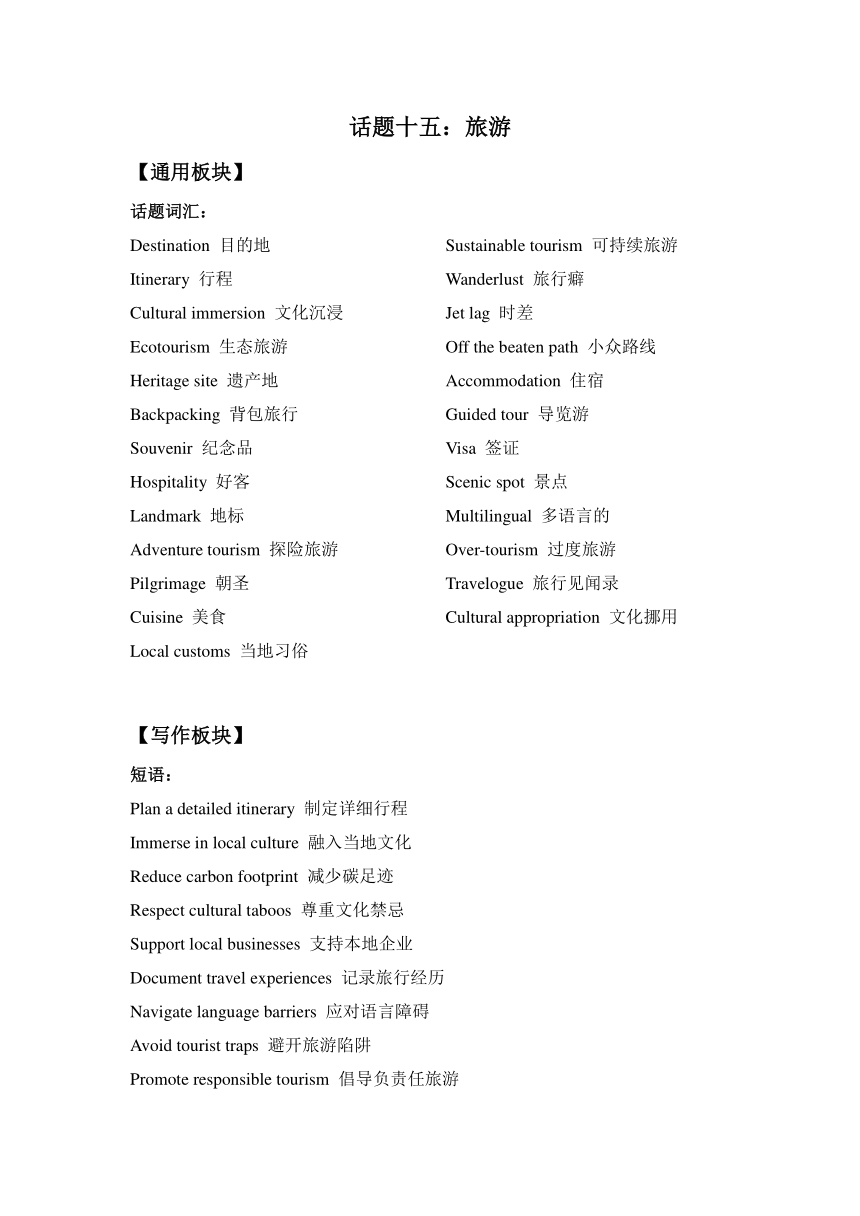
话题十五:旅游 【通用板块】 话题词汇: Destination 目的地 Itinerary 行程 Cultural immersion 文化沉浸 Ecotourism 生态旅游 Heritage site 遗产地 Backpacking 背包旅行 Souvenir 纪念品 Hospitality 好客 Landmark 地标 Adventure tourism 探险旅游 Pilgrimage 朝圣 Cuisine 美食 Local customs 当地习俗 Sustainable tourism 可持续旅游 Wanderlust 旅行癖 Jet lag 时差 Off the beaten path 小众路线 Accommodation 住宿 Guided tour 导览游 Visa 签证 Scenic spot 景点 Multilingual 多语言的 Over-tourism 过度旅游 Travelogue 旅行见闻录 Cultural appropriation 文化挪用 【写作板块】 短语: Plan a detailed itinerary 制定详细行程 Immerse in local culture 融入当地文化 Reduce carbon footprint 减少碳足迹 Respect cultural taboos 尊重文化禁忌 Support local businesses 支持本地企业 Document travel experiences 记录旅行经历 Navigate language barriers 应对语言障碍 Avoid tourist traps 避开旅游陷阱 Promote responsible tourism 倡导负责任旅游 Preserve natural heritage 保护自然遗产 Embrace spontaneous adventures 拥抱即兴冒险 Adapt to local etiquette 适应本地礼仪 话题经典例句: Sustainable tourism emphasizes minimizing environmental impact while fostering local community engagement. (可持续旅游强调减少环境影响,同时促进当地社区的参与。) Cultural immersion goes beyond sightseeing; it involves understanding traditions and participating in daily rituals. (文化沉浸不止于观光,还包括理解传统并参与日常仪式。) Over-tourism in popular destinations like Venice has sparked debates on balancing economic benefits and cultural preservation. (威尼斯等热门目的地的过度旅游引发了经济收益与文化保护的平衡讨论。) Backpacking through Southeast Asia offers not only scenic beauty but also lessons in humility and adaptability. (东南亚背包旅行不仅提供美景,还教会谦逊与适应力。) A well-curated travelogue can inspire others to explore responsibly while highlighting lesser-known cultural gems. (精心撰写的旅行见闻录能激励他人负责任地探索,并揭示鲜为人知的文化瑰宝。) Adventure tourism, such as hiking remote trails, challenges physical limits and reshapes one’s perspective on nature. (探险旅游,如徒步偏远小径,挑战身体极限并重塑对自然的认知。) 话题相关范文: The Value of Responsible Travel Traveling is more than a leisure activity; it is an opportunity to connect with the world responsibly. By choosing eco-friendly accommodations and supporting local artisans, tourists can contribute to sustainable development. For example, avoiding single-use plastics during trips helps protect fragile ecosystems. However, the rise of over-tourism threatens both cultural and natural heritage. Crowded landmarks and excessive resource consumption demand urgent action. Governments and travelers alike must prioritize regulations and mindful practices to preserve destinations for future generations. In conclusion, responsible tourism requires awareness and commitment. By respecting local cultures and minimizing environmental harm, we can ensure that travel remains a force for global understanding and preservation.. 【阅读板块】 阅读常 ... ...
~~ 您好,已阅读到文档的结尾了 ~~

